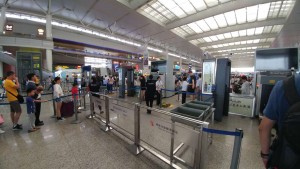Shanghai Street View: Cleanup Compulsion

Beijing may have APEC Blue, but Shanghai is quickly developing its own brand of welcome for the upcoming G20 Summit set to take place next month in nearby Hangzhou. But in this case, it’s an obsession with security that seems to be riveting our city, though perhaps we’ll also see some pollution and traffic-easing measures as the event approaches.
For anyone new to China, the term APEC Blue came into fashion 2 years ago when Beijing hosted the Asia-Pacific Economic Cooperation summit, a meeting of major world leaders that briefly put the city in the global spotlight. A similar light will shine on Hangzhou next month when leaders of the world’s largest economies gather in there for a similar meeting. Many visitors may arrive via Shanghai, which has much more international connections and therefore could also be on prominent display.
More broadly speaking, first Beijing and now Shanghai’s obsession with things like the color of the sky and security seem to stem from a more deeply ingrained insecurity that somehow the world might come away with a bad impression of the country.
The phenomenon also seems to have its roots in modern China’s fascination with big events, which is probably a subset of what I call the “famous brand syndrome” or mingpai. Such a fascination often sees people put form ahead of substance due to an excessive fascination with appearances. I see the phenomenon quite regularly at my university, where I’m constantly reminding my journalism students that they should focus on the content of what was said at such major meetings rather than simply the fact that a meeting took place.
But that said, the fact does remain that conferences like the G20 Summit are major global events, and Shanghai has already begun taking the matter very seriously. One of the first measures announced earlier this week was higher airport security, even though it seems to me that security at Pudong and Hongqiao airports is already quite tight.
As part of the new measures, all people are now being screened as soon as they enter the airport rather than only before they get ready to board a plane. Pudong has added 27 new inspection stations under that effort, while Hongqiao has added 14, and both airports are issuing the usual calls for passengers to arrive early to avoid missing their flights.
More Police on Patrol
But visitors to the city will discover that airports are just the first place they will see the extra security. In addition, Shanghai will sharply increase the number of officers patrolling our streets as the event nears. That will include putting up to 90 percent of our police officers on patrol, up from the usual 60-70 percent, and having officers conduct more ID checks. I got to witness the increased security the other day inside my local subway station, which suddenly became packed with police and bomb-sniffing dogs one afternoon just before rush hour.
We still have yet to hear of any measures similar to the APEC Blue campaign, which saw most major factories in Beijing and surrounding Heibei province ordered to temporarily suspend operations in the weeks before the summit to clean up the air. Cars on the street are also typically restricted during such periods to lighten traffic and ease pollution, and many companies give their workers time off to also ease congestion.
While such measures may be welcome by some, businesses don’t quite see things that way. A recent survey I helped to conduct showed that foreign businesses were worried about disruptions due to closures of roads, infrastructure and also many of their suppliers and local business partners before and during the G20, which will be held on September 4-5.
It’s unclear if Shanghai will resort to such measures, partly because the summit itself won’t happen here. What’s more, the brutally hot weather of the last month has brought the small consolation of relatively good air quality, meaning we can know that we won’t get respiratory diseases as we bake in the sun. But that could change as the summit gets closer, and I wouldn’t be surprised to see Shanghai roll out similar measures to restrict factory operations and even possibly easy road congestion as the summit nears.
At the end of the day, the heightened security does seem like a good idea since so many world leaders and other high-ranking officials and businessmen will be in the area. Perhaps the security screeners in our subways will even start doing their jobs more seriously.
As host cities, Hangzhou and nearby Shanghai do have a responsibility to put on their best faces and provide a safe environment for such a big show. But I also hope they exercise a little restraint in their actions, acknowledging that our cities aren’t just showcases for this big event but are actually home to millions of people who simply want to go about their daily lives with minimal inconvenience.
